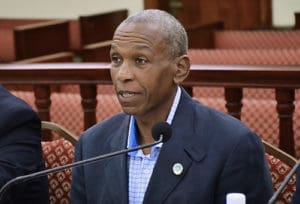
After a contentious debate, USVI lawmakers voted to hold in committee what is commonly referred to as the “dig once” bill.
The bill’s purpose is to encourage communications facilities and services to work together and dig only once for the installation, relocation and improvement of conduits and appurtenances installed by government agencies to help reduce numerous excavations and disturbances.
Sen. Janelle Sarauw, who sponsored the bill, pointed out Wednesday to the Housing, Transportation and Telecommunication Committee that the Virgin Islands isn’t the first to propose such legislation, but several other states have established similar policies.
Last year, however, the governor vetoed the bill. Sarauw said the “false narrative” of why this occurred was because it was said if enacted the Virgin Islands would be at risk of losing $19 million in federal aid. But she argued that this assumption didn’t make any sense because of the Consolidated Appropriations Act of 2018, which later became Public Law 115-141 in March 2018, that specifically lays groundwork for dig once policies.
“There is no way the federal government can be affected when the federal government is mandating that states and municipalities lay groundwork for potential dig once policies,” Sarauw said.
But testifiers were divided in their support of the bill. Stephan Adams, the president and CEO of Virgin Islands Next Generation Network, said because viNGN is a public corporation whose role is to provide wholesale broadband middle mile service to internet service providers, his agency cannot support the bill.
“We are not in favor of any ‘dig once’ legislation that has the effect of allowing any ISP access to existing or planned laid conduit,” Adams said. “Direct conduit access could give a well-financed ISP a disproportionate competitive advantage over less capitalized competitors.”
He said the bill also allowed for the potential that an ISP with direct conduit access could enable them “to gain a monopolistic lock on the internet market.”
Adams said the public has entrusted viNGN to “safeguard its assets and to leverage them for public benefit,” meaning they are charged with maintaining a “level playing field.” He said the market becomes unequal if viNGN favors a greater capitalized ISP over a smaller competitor to gain direct access to their costly fiber infrastructure.
More than $100 million was spent by federal and local governments, Adams said, to build viNGN’s fiber optic network, of which the most expensive part of the project was trenching and laying the conduit. He added that the huge, high-capacity pipeline contains 288 strands of fiber, which is sufficient capacity for the entire territory for decades to come and all of which belongs to viNGN.
Allowing for private sector ISPs direct access to viNGN’s conduit also raised legal questions from Adams who said, “because the viNGN middle mile is subject to federal restrictions mandating that the conduits and other equipment be used only for the project set out in the grant and no other purpose.”
He questioned who would be responsible for maintenance and liability when, as it sits, viNGN “is fiducially and fiscally responsible for the operation and integrity of our fiber infrastructure.”
Sen. Donna Frett-Gregory said Adams’ argument has validity.
“If we invested and went to the federal government and said this is what we are going to do, I think that the discussion needs to be had with all the providers as to why viNGN should be the leading provider here in the territory and while I understand the importance of ‘one dig’ … the majority of this issue is surrounding our fiber optics.”
But Sarauw maintained that the bill was necessary and that if enacted “we would know who is in whose business.” She expressed a scenario where one would call VIYA and they would tell you WAPA cut their fiber, but then you would call WAPA and they would say that it is not true, leaving residents without internet service. She insisted it is better to know and, with this legislation, the government would.
Sarauw said last year viNGN’s only opposition to the bill was the alleged jeopardy of $19 million in federal funding, but now it’s about protecting assets.
“But let’s talk about the environmental impact, economic impact and social impact,” Sarauw said.
“It lowers the cost of infrastructure deployment when completed in conjunction with other infrastructure improvements,” Sarauw said. “It promotes and it facilitates integration broadband infrastructure. There is a reduction in land disturbance activities and from an administrative standpoint it reduces the potential number of project reviews, permits and inspections. There’re greater environmental protections, less soil disruption and diminished water quality from sediments, and less potential habitat disruption. It promotes the coordination among multiple providers.”
In Sarauw’s opening statement, she pleaded with the senators and testifiers “to not go back in a circle discussing ‘dig once,’ but instead to move forward.”
But Sens. Frett-Gregory, Stedmann Hodge Jr., Myron Jackson and Marvin Blyden voted to hold the bill in committee for amendments and revisions.
Sens. Allison DeGazon, Alicia Barnes and Javan James were absent from Wednesday’s vote.





